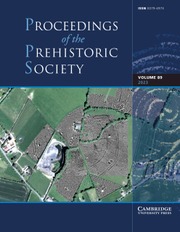Article contents
The Origins of Domestic Sheep and Goats: a Reconsideration in the Light of the Fossil Evidence
Published online by Cambridge University Press: 27 May 2014
Extract
In recent discussions of the origins and process of animal domestication (Reed, 1961, Zeuner, 1963), both authors rely on two kinds of evidence: on the one hand, the present distributions and characteristics of the different breeds of whatever animal is being discussed, together with its feral and wild relatives, and, on the other hand, the past record, given by literary and pictorial sources and the bones from archaeological and geological sites. Increased recognition of the limitations of the past record, whether in the accuracy of the information it appears to give (as in the case of pictorial sources), or in the certainty of the deductions we are at present capable of drawing from it (this applies especially to the osteological record), has led these authors to argue mainly from the present situation, using the past record to confirm or amplify the existing picture.
Arguing from the present, many hypotheses about the origins and process of domestication are available. The only test we have, when attempting to choose between these, lies in the direct evidence of the past record. The past record, it is freely admitted, is very fragmentary: the information provided by the present situation is more exact, ranges over a much wider field, and is more open to test and control. Nevertheless, the past record, however imperfect it is, is the only direct evidence we have about the process of domestication.
- Type
- Research Article
- Information
- Copyright
- Copyright © The Prehistoric Society 1969
References
BIBLIOGRAPHY
- 12
- Cited by


